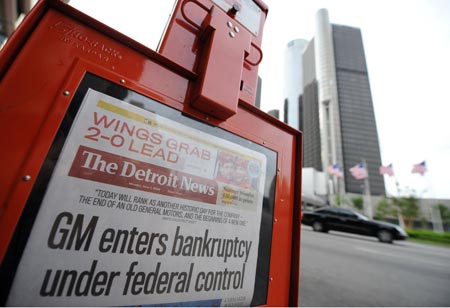A severe crisis beginning during the second half of 2008 has forced the world's auto industry into a total shakeup, as new players and others compete in a landscape under new rules.
 |
|
A piece of news about the General Motors Corp. filing for bankruptcy protection is seen on the front page of a newspaper in Detroit, the United States, June 1, 2009. The largest U.S. automaker, General Motors Corp., officially filed for bankruptcy protection at 8 a.m. EDT (1200 GMT) on Monday, the largest bankruptcy protection case in the U.S. industrial history. [Xinhua] |
Sweeping crisis
2008 has been a difficult year for automakers around the world. An unprecedented oil price rally forced Americans, who drive most in the world, to drive less. And when oil prices took a free fall as the economy hit a downward trend, so did the demand for vehicles.
With the financial crisis sweeping the world, the auto industry was caught in the credit crunch -- consumers could not get loans to buy cars while the companies faced a shortage of liquidity to keep operating. And as reports of large layoffs were publicized almost on a daily basis, cash-trapped consumers were reluctant to make large purchases like buying a car.
Car sales dropped to the lowest levels in nearly three decades. Toyota, which replaced General Motors Corp. as the world's top automaker, reported an operating loss for the fiscal year ending March, first time in 70 years. Its sales fell 27 percent in the first quarter 2009.
Car companies from Asia, Europe, North America and elsewhere have been forced to implement creative marketing strategies to entice consumers to purchase vehicles, when many firms are experiencing double digit percentage sales declines. Major manufacturers, including the Big Three -- GM, Ford, and Chrysler -- and Toyota, are offering substantial discounts. Hyundai is even offering to allow customers to return their new cars if they lose their jobs.
Government rescue
Despite much controversy on whether it is worth pumping taxpayers' money into an industry which many believe is doomed to fail, governments around the world have reached out to their troubled auto companies.
There was a wave of auto bailout on both sides of Atlantic at the end of last year. In France, the government provided 1.5 billion euros (2 billion dollars) in aid to its struggling automobile industry. In Britain, a rescue package of up to 1 billion pounds (1.5 billion dollars) was offered to the Tata group, Indian owner of Jaguar and Land Rover. Sweden, home of Ford's Volvo division and GM's Saab division, has passed a 3.6-billion-dollar aid package to prevent a collapse of its auto industry.
The U.S government has injected more than 20 billion U.S. dollars into Detroit's Big Three. The Canadian government has provided around 3.3 billion dollars to subsidiaries of General Motors, Ford and Chrysler in Canada. And as GM and Chrysler could not manage stay above water, an organized bankruptcy was pushed and directed by the government. The U.S. and Canadian governments will own a combined 72 percent stake in the new GM once it emerges from bankruptcy.
One day before GM's court filing, the German government agreed to lend Opel, GM's European subsidiary, 2.1 billion dollars, to pave the way for the acquisition of the company by Magna International Inc., a Canadian auto parts supplier.
Face-off game
The bankruptcy filed by GM, once the largest automaker and largest company in the world, has marked a new era in the world's auto industry.
Japanese car makers are well-positioned for steady steps through the crisis. Due to slow sales of its Tundra pickup, as well as shortages of its fuel-efficient vehicles such as the Prius, Corolla and Yaris, Toyota has seen sales falling at two digits. In response, the company has announced plans to idle its truck plants, while shifting production at other facilities to manufacture in-demand vehicles.
What's noteworthy is the rise of Italy's Fiat SpA, once seen as aging, sick and outplayed. GM signed a joint-venture agreement with Fiat in 2000 under which GM acquired a stake in Fiat Auto. But when Fiat tried to sell GM the company, GM chose to pay a penalty of 2 billion dollars and annulled the agreement.
But under the management of Sergio Marchionne since 2004, Fiat turned around and saw its first profit in 17 quarters in fourth quarter of 2005. The success of the Grande Punto model, Bravo (successor to the Stilo) and the award-winning 500 have further cemented it.
Fiat has formed a joint venture with India's Tata Motors and China's Chery motors. It has also re-entered several large markets that it had exited years before, such as Mexico and Australia.
Fiat is determined to return to the U.S. market by 2010 with the new 500. Though it lost in the bid for GM Europe's Opel, it will, once the U.S. bankruptcy judge approves, get a 20 percent stake in Chrysler and can become the majority owner once the government loans are repaid.
(Xinhua News Agency June 3, 2009)